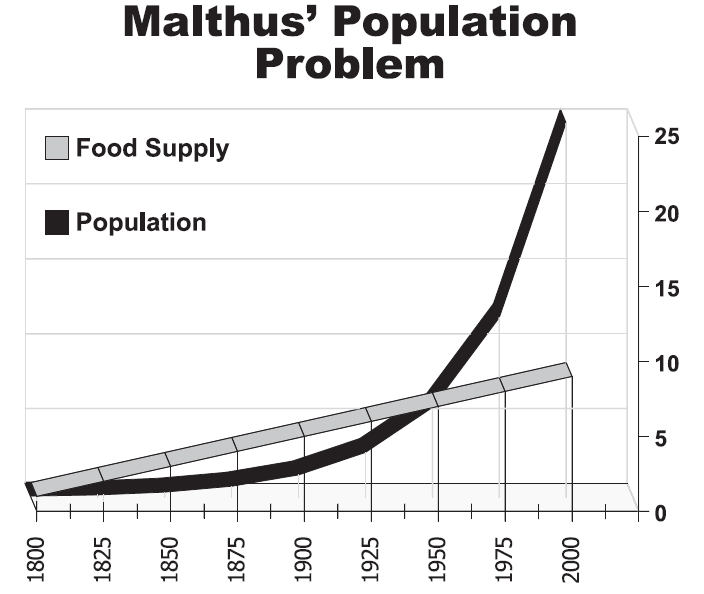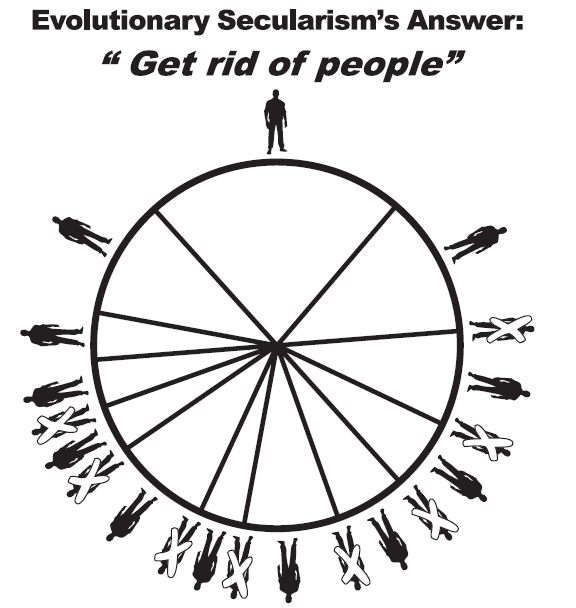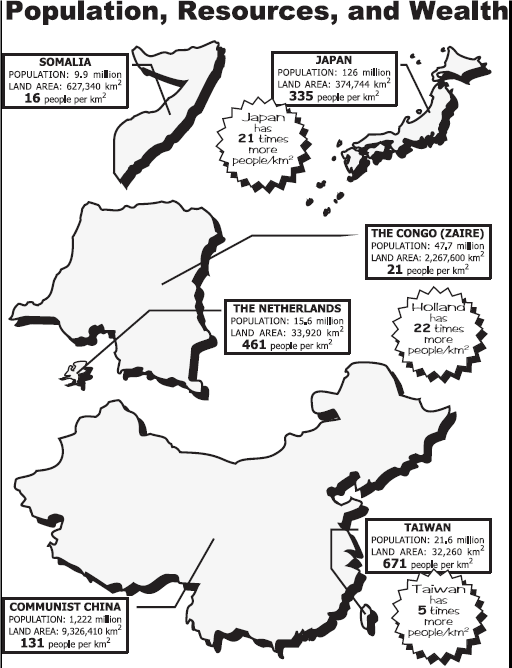Evolutionists explain poverty in material terms
Given that more Christians are alive than at any time in world history, that more churches (and more large churches) exist, why do our nations remain so broken?
Secularism says that the roots of human brokenness in its many manifestations (hunger, poverty, injustice, environmental degradation, mental and emotional suffering, exploitation, and so on) are found in the physical world. Many secularists embrace an evolutionary narrative as an explanation for these realities. According to this view, human beings are mere animals and reality is solely material. In short, too many people are overcrowding the world, food supplies are insufficient, and natural resources or infrastructures are insufficient for adequate food production.
 Over two hundred years ago, Thomas Malthus (1766–1834), an English minister, wrote An Essay on the Principle of Population, which remains foundational for advocates of population control who fear global overpopulation. Malthus asserted that population, when unchecked, increases in a geometric ratio, while the food supply increases only in an arithmetic ratio. In other words, resources grow by addition but population grows by multiplication. Malthus feared that population growth would outstrip food supply, leading to mass starvation.
Over two hundred years ago, Thomas Malthus (1766–1834), an English minister, wrote An Essay on the Principle of Population, which remains foundational for advocates of population control who fear global overpopulation. Malthus asserted that population, when unchecked, increases in a geometric ratio, while the food supply increases only in an arithmetic ratio. In other words, resources grow by addition but population grows by multiplication. Malthus feared that population growth would outstrip food supply, leading to mass starvation.
This kind of thinking also finds its way into discussions about a supposed lack of natural resources. When I was in Somalia during one of their recurring famines, I heard some relief workers, reflecting their secular mindset, say Somalia would never develop because it lacks natural resources. “What is the market for camels in Japan, the United States, or Korea?” In their minds, Somalia was hopeless. Believing that natural (read material) resources are the key to flourishing, these well-intentioned people relegated an entire nation to perpetual poverty.
Some evolutionists blame poor infrastructure
At other times, evolutionists say the problem is not inadequate resources but a lack of infrastructure. Exhibit A for them is India, which for years has been a net food exporter. India, they say, has produced more than enough food to feed its people, yet large numbers remain hungry. Secularists explain this paradox by saying that there are not enough roads, bridges, and storage facilities.
Exhibit B might be Africa, which is home to a thousand language groups. In Ethiopia alone, a hundred languages are spoken, and only 30 percent of the people speak the national language, Amharic. This multiplicity of languages makes it difficult for commerce, education, and communication to thrive. Hence, the theory goes, people go hungry.
When we see the problem as “too many people,” the solution is as obvious as it is deadly: eliminate some people (see fig. 2.2). Garrett Hardin, a former professor of biology at the University of California at Santa Barbara, came up with the “lifeboat ethics” concept: A big ocean liner, symbolizing the world, is sinking. There is one lifeboat, and it will not hold all the passengers. So we need to get rid of some of them. (Exactly who is left on board is a matter of interesting debate.) The idea is to “let nature take its course.” Hardin has said that when a famine kills people, it is a tragedy for the starving people but a good thing for their nation and the world. Nature, according to this view, is simply taking care of the overpopulation problem.
Other evolutionists call for population control
Of course, some evolutionists refuse to be this cold-blooded. They say we can solve this poverty through science and technology. This usually turns out to mean population control. Sometimes the statements of these advocates can be quite revealing. The major focus of the much-criticized 1994 United Nations Conference on Population and Development in Cairo could be summarized as, “How do we stop the people of color, the people in the Third World, from having children?” This approach, called “eugenics,” seeks to control human reproduction, sometimes by weeding out the weak. An early advocate, Planned Parenthood founder Margaret Sanger, once said, “Many of this group are diseased, feeble-minded, and are of the pauper element dependent upon the normal and fit members of society for their support. There is no doubt in the minds of all thinking people that the procreation of this group should be stopped.”
 The evolutionary secularists regard Somalia as a classic example of too many people and too few resources, and thus destined to poverty. But their argument is devastated by Japan, Singapore, and the Netherlands, among many others, all prosperous small nations with few natural resources. (For further elaboration of this argument, see What God Thinks About “Overpopulation”.)
The evolutionary secularists regard Somalia as a classic example of too many people and too few resources, and thus destined to poverty. But their argument is devastated by Japan, Singapore, and the Netherlands, among many others, all prosperous small nations with few natural resources. (For further elaboration of this argument, see What God Thinks About “Overpopulation”.)
This evolutionary position stems from a materialistic point of view. Hunger and poverty are seen primarily in physical terms: in nature, in the environment, in circumstances. Nature is a closed system, enclosed in a cosmic titanium box. By definition, matter is all that matters. Resources are limited. Thus, in this scheme man is little more than a consumer of scarce resources, an animal with a mouth and a stomach. If the problem is defined in material terms, the solution will be framed in material terms too.
Only evolutionists think there are too many children
Malcolm Muggeridge, one of the leading television journalists of his day, was a third-generation Marxist. One day in Calcutta Muggeridge asked Mother Teresa, “Why, when there are so many children in the world, do you try to keep these kids alive?” Her only answer was a quizzical look. Thinking this a basic question, he tried once more, again to no avail. That night in his hotel room, an insight dawned on him (he said later that this was his spiritual turning point). He realized that he and Mother Theresa saw those children differently. He saw them as consumers; she saw them as God-image bearers. To ask Mother Teresa, “Aren’t there too many children in the world?” was like asking, “Aren’t there too many stars in the sky and too many flowers in the field?” For her the question was absurd.
We must see the problems and opportunities of human existence through the lens of the only story that aligns with reality. This story, which comes from the Bible, will provide us with a much broader and deeper analysis. And as a consequence, it will lead us to radically different solutions.
– Darrow Miller
This DM&F Classic blog post is excerpted from the book Discipling Nations. For the entire text go here.






